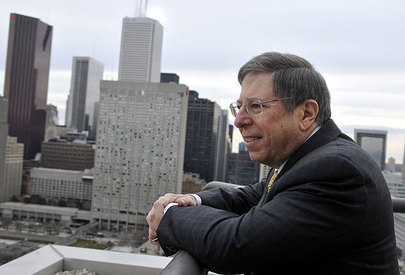E. Jane Murray, an Ottawa-area family
lawyer. "The problem is that any Tom, Dick or Harry
doesn't know what they are doing." Murray called it a
"sad situation when the mediator ends up doing more harm
than good."
During a recent Toronto
Star investigation of problems in the Ontario
family court system, the top issue was the costly wait
due to a lack of judges, mainly the result of the
federal government's failure to keep up with
appointments.
However, running a close second were
stories about mediators – and other family law
professionals such as assessors – as well as the
public's general lack of understanding about the
services available.
Philip Epstein, a Toronto family lawyer
and veteran mediator, says it's "unfortunate people can
be talked into unreasonable and inappropriate
agreements. It's in everybody's interest that mediators
meet a minimum standard of professionalism." It
shouldn't be a "casino or free-for-all," he said. "The
law must be the guide for agreements."
Toronto has the highest percentage in
Canada of divorcing couples opting for mediation, with
Epstein estimating 60 per cent choose the service in
some form. There are no numbers for divorces in the GTA
but the most recent StatsCan report pegs the number of
divorces in Ontario at 27,513 in 2003.
The lack of regulations had led many
professionals to urge Premier Dalton McGuinty's
government to focus on mediation and assessment to
ensure proper supervision and a recognized complaint
system.
Dr. Barbara Fiddler, a Toronto
psychologist and mediator with 25 years experience, says
"mostly there are good people who are trying to do a
good job."
Still, she calls on the provincial
government to "take a closer look" at the industry so
that everybody is protected. She argues there should be
minimum professional standards and the province must
support proper training and educational programs.
But Ontario Attorney-General Chris
Bentley says there is no need to regulate because these
fields are self-regulating.
In an email from a spokesperson, Bentley
pointed out family law professionals "are generally
members of self-regulating professions," and thereby
bound by rules of professional conduct with established
complaint processes.
"It's not as if nobody has to answer to
anyone," he said, stressing family law mediators "need
to meet a specific set of qualifications if they are
members" of professional organizations, such as the
Ontario Association of Family Mediators.
The operative word, however, is if.
If they are members of
professional organizations with codes of conduct and a
complaint process, mediators are indeed regulated.
But mediators can come from a wide
variety of backgrounds, including lawyers,
psychologists, psychiatrists and social workers and
there are differences in oversight. A lawyer, for
example, has to be a member of the bar association but
someone with a degree in social work doesn't necessarily
have to be on the roster of the Ontario College of
Social Workers.
Fees also vary. A lawyer working as a
mediator might charge $400 an hour in Toronto, while a
psychologist might start at $300 to work either as
mediator or assessor. An assessment can cost $10,000 to
$30,000 and take six months.
Anisa Ali, a Toronto-based mediator who
voluntarily belongs to the Ontario Association of Family
Mediators, sees too many people hanging out a shingle
and throwing around the terminology. She charges $150 an
hour and says "a lot of the bad apples undercut prices
to get clients."
"Beware of professionals playing
multiple roles – for example, psychologist/family
counsellor then mediator then parenting co-ordinator
(who help a couple work out a parenting plan)," warns
Ali. "The issue of confidentiality becomes muddled," she
says.
Bentley also notes there are
government-funded mediators available through family
courts in Ontario who must meet the standards of the
Ontario Association of Family Mediators. As well, the
province's Arbitration Act sets tough standards for the
arbitration process, more often chosen in high-conflict
cases. (Amendments last year to the Family Law Act made
several changes, including the removal of the right of
parties to choose faith-based arbitration.)
Bentley adds he won't further regulate,
explaining: "These measures provide a significant level
of quality assurance within our family court system."
A significant level of quality
insurance. Not all-encompassing.
A website set up for the public to
monitor the justice system –—
www.canadacourtwatch.com – details complaints to its
Family Justice Review Committee. People have complained
about assessors conducting themselves "in an
unprofessional and unethical manner," whether by using
selected information to tilt the outcome in favour of
one parent, refusing to accept pertinent information or
failing to "conduct a proper child custody evaluation
and, in many cases, actually caus(ing) harm to their
case and to the children."
"That's exactly what happened to us,"
said the family member whose case begins this story. "We
were very unhappy with the mediator but we were afraid
to complain. We were confused precisely because there is
no process. It's very complicated without rules and
regulations."
She claims the mediator took on the role
of supervising the boy's visits with his father,
steering the family away from $80-an-hour supervised
visits available through family court, in favour of her
own $175-an-hour services. She also tabled a report with
the court without having shown it to the family.
Ali has seen mediators who don't tell
their clients their reports aren't legally binding or
that they have recourse to mediation through the courts.
People don't have to be afraid, she says.
